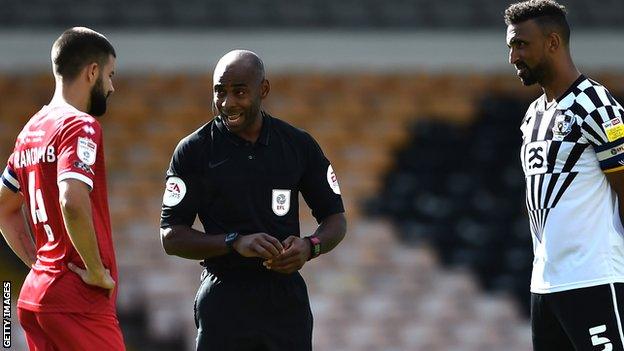Referee Sam Allison on encouraging more BAME officials and his own positive experiences
- Published
Refereeing is for everybody - Allison (Sept 2020)
It was a phone call Sam Allison will never forget. The firefighter was at work at Trowbridge fire station earlier this summer when he was told he had been promoted to be a referee in the English Football League.
The last black referee in English football's top four divisions was Uriah Rennie, who retired in 2009.
Allison's promotion came following the latest recruitment process by Professional Game Match Officials Limited (PGMOL), the body responsible for refereeing appointments in English leagues. It also promoted Paul Howard, who is mixed race.
"I believe I'm a role model and I'm trying to help others who look like me and show them that there is a path for them too," says Allison, who was the referee for Port Vale's win over Crawley last Saturday.
"I don't even like saying a role model," the 39-year-old told BBC Sport. "I want to be a 'floor model' so that others can stand on me to get up.
"I'm not one of those guys that climb the ladder and pull it up behind them. I want that ladder to be there for everyone to climb as well and I can just support as many people as I can. If I do that, I've done what I wanted to achieve."
'No barriers and no abuse'
A year after Rennie retired, Jarnail Singh, the last Asian referee in the EFL, followed suit. His older son Sunny Gill is a referee in the National League, while his younger son Bhupinder is an assistant referee in the Championship. But BAME officials remain a rarity.
Allison, who will referee in Leagues One and Two this season, says there are no barriers to progression for BAME officials, despite the low numbers.
"Initially, you think 'is the organisation racist?'" said Allison. "Once you start to get in there, it's far from it. I think it's just probably something that you think, 'because you can't see them, it must be the case'.
"For me, I've only had good support all the way through my journey."
Allison, a former semi-professional footballer, says he initially dismissed the idea of becoming a referee when it was suggested to him in 2011 because he had had "so many disagreements" with officials.
Two weeks later, he was on a course.
"I've had this question [about negative experiences] quite a few times and it's quite an easy question to answer because I haven't had any," he said.
"To come through a system that quickly, you can't then say you've had lots of barriers against you. In games, I've not really faced anything."

Allison took charge of Port Vale's win over Crawley last Saturday
'Being black, you're more likely to be remembered'
While he is positive about the smooth progress he has made, does Allison feel under more pressure because he is black?
"I'm not sure what the pressure is for other referees but, for me, I do feel that when you go to games you're more likely to be remembered," he said.
"Unfortunately, that is the nature of the beast but you can't let that prevent you from being successful.
"At the end of the day, some of the skills that you need to be a referee are resilience, integrity and desire. You need to be quite thick-skinned and drown out some of the noise and crack on and do what you are doing."
The Premier League is the goal for referees in England but Allison is taking things one step at a time.
"Of course, every referee wants to get to the Premier League but they are good referees - they are the pinnacle.
"I'm probably at the bottom of that pile at the moment but what I will do is work my hardest to try to get as good as I can be."

Football Daily: Who impressed on the opening weekend?
Thriller Podcasts: What they can tell us about the future
